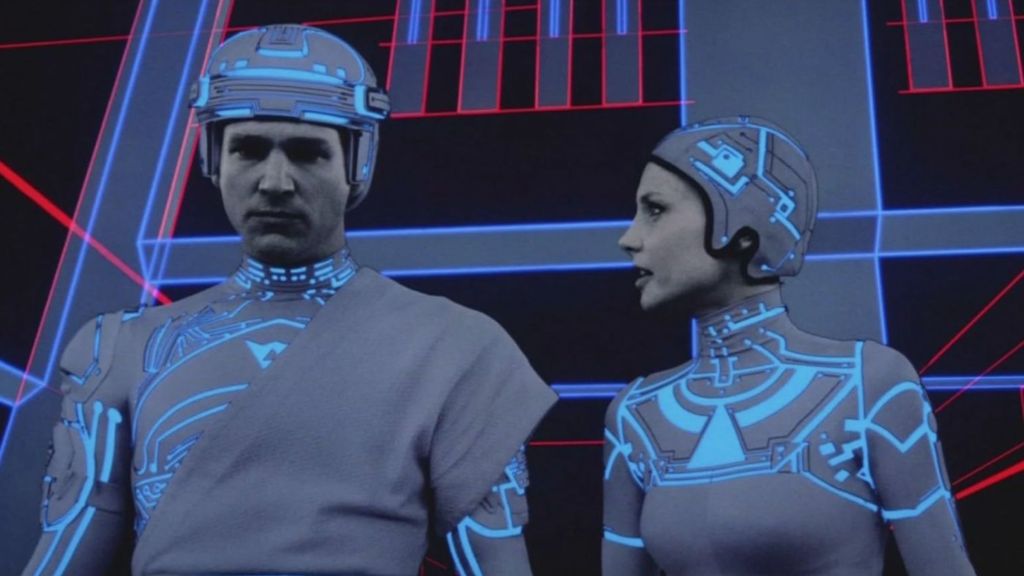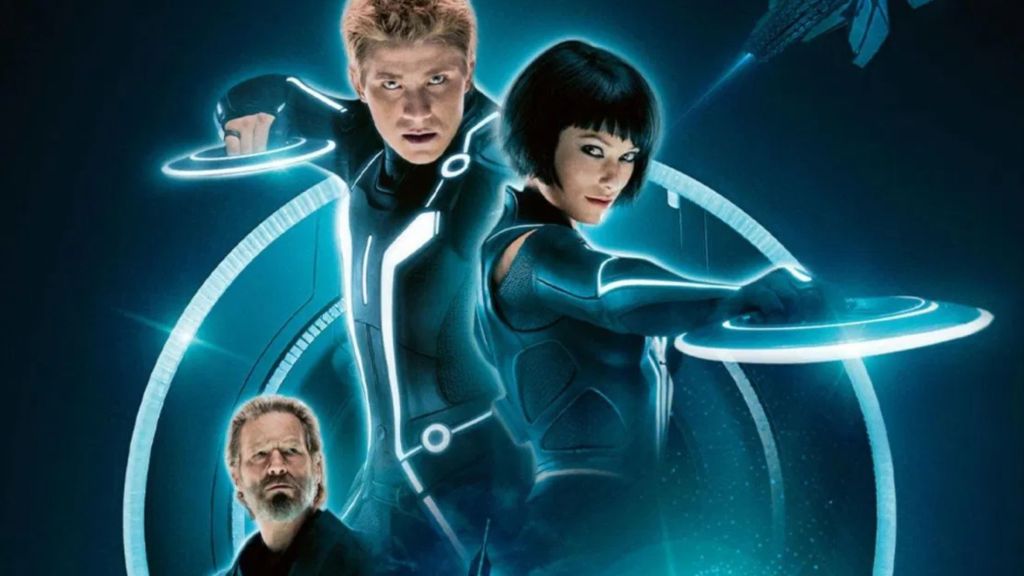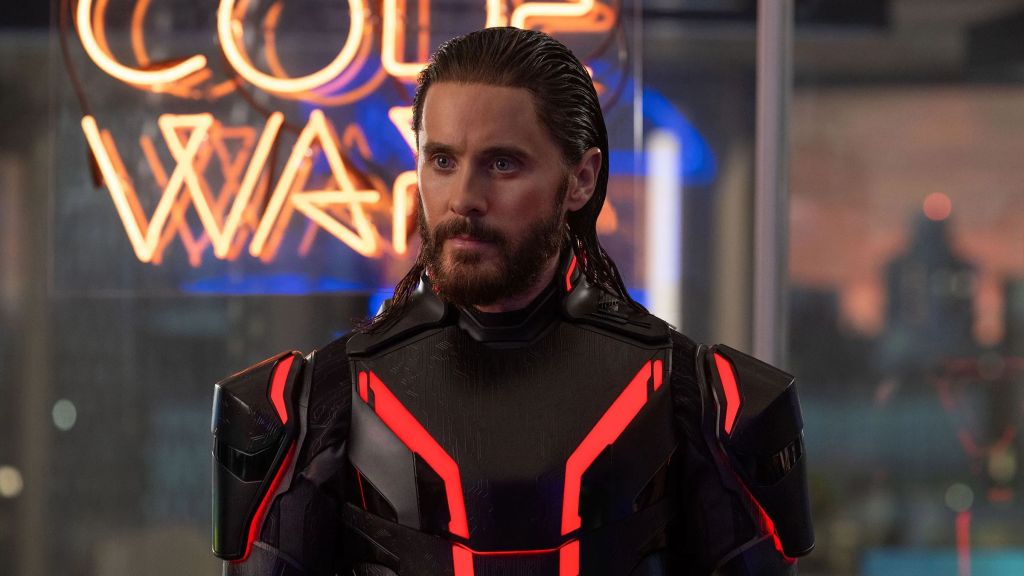After 15 years we finally have another Tron movie and, in spite of some not so favorable reviews and a lackluster opening weekend performance at the box office, it’s a good time worth seeing on the biggest screen in your area. But, without a doubt, the Grid world of Tron is a complicated place, so prospective audience members might need a bit of catch-up before buying a ticket. This is especially true given the massive gaps between both the first and second films and the second and third. So we’re going to go through all three films here, Tron, Tron: Legacy, and Tron: Ares, and hit all the big points.
Videos by ComicBook.com
Note that we did leave off the events of Disney XD’s Tron: Uprising, which takes place between Tron and Tron: Legacy. Technically it is canon, but it was cancelled after a single season, which ended on a cliffhanger. And, more importantly, there’s no mention of its protagonist, Beck (Elijah Wood), in Tron: Legacy.
Naturally, spoilers for Tron: Ares follow.
Flynn Discovers the Grid

The first time we meet Kevin Flynn he’s no longer an employee of ENCOM, opting instead to run a video game arcade. But he’s the rebellious type, so he uses a program called Clu to attempt to hack into the system of his former employer.
Clu is discovered and eliminated by ENCOM’s Master Control Program and its second-in-command, Sark, who just so happens to look like ENCOM’s senior executive vice president Ed Dillinger. Dillinger rose through the ranks of the company by taking a few of Flynn’s videogame creations and passing them off as his own, then booting Flynn out the door.
Flynn wants nothing more than to expose Dillinger as the thief he is, but now that Dillinger is aware of Flynn’s efforts, the whole system has been put on lockdown. However, Dillinger isn’t aware that two of ENCOM’s employees, Alan Bradley and Dr. Lora Baines, are willing to help Flynn gain access to the system once more.
They break into ENCOM in the hopes of unlocking Alan’s “Tron” program, which could essentially rise up against the MCP. Naturally, the MCP feels threatened by the trio after they break in and, in a defensive measure, it uses a laser on Flynn which sends him into the digital world aka the Grid.
The MCP commands Sark to deal with Flynn, specifically by having him compete in a series of deadly games. But as a user, especially one who has not only played but created video games, Flynn bests the MCP’s lackey at every turn. Things only get more dangerous for the MCP (who is also blackmailing Dillinger back in the real world) once Flynn partners with Tron and Yori who look like, respectively, Alan and Dr. Baines.
Even with his user powers, which allow him to rebuild a damaged Recognizer ship amongst other things, Flynn, Tron, and Yori find themselves frequently outmatched. After they commandeer a “Solar Sailer” they head to the MCP’s core so Tron can utilize the information sent to him by Alan, but it is smashed to bits by Sark’s command ship. Sark captures Flynn and Yori, but Tron is thought dead.
But Tron isn’t dead. In fact, like Sark, he’s now at the MCP’s core. The MCP is in the midst of absorbing every powerful program available in the system, which is a process Tron threatens to interrupt. The MCP grants Sark all of its power and both Sark and Tron duke it out. Meanwhile, Flynn distracts the MCP, causing a rupture in its shield, at which point Tron strikes and destroys both the MCP and Sark.
After a tearful goodbye we are now back in the real world. Dillinger comes into his office thinking he’ll have another tense conversation with the MCP only to find it deactivated. Worse yet, the news is circulating that he’s a fraud. He sits back in his chair, resigned to his fate. Flynn, however, finds himself getting a massive promotion. He is now CEO, flying in on a helicopter to meet Alan and Dr. Baines on ENCOM’s helipad.
Sam’s Search for Flynn

Seven years after returning from the Grid and becoming ENCOM’s CEO, Kevin Flynn outright disappeared, leaving behind his son, Sam. And in Tron: Legacy we meet Sam just as we met his father: being a rebel and breaking into ENCOM. The difference is that Sam is now ENCOM’s primary shareholder. He’s breaking into his own company because he believes its OS should be given to the people of the world for free.
Once he’s arrested, Sam’s bail is posted by his father’s old pal, Alan Bradley. Furthermore, Alan tells Sam that a message came from Flynn’s arcade, which is strange considering the place hasn’t been open since his father disappeared. Once there, Sam finds a hidden basement, a massive compute, and a particle laser just like the one that sent his father into the Grid the first time. And, standing in front of it, that particle laser does its thing once more.
After finding himself wounded (and bleeding, which the programs haven’t seen before) in one of the dangerous games, Sam is taken to a man he believes is his father. But it turns out it’s Clu (played by a de-aged Jeff Bridges). Or, rather, Clu 2, considering the original Clu was derezzed at the beginning of Tron.
Clu tries to kill Sam in a Light Cycle match, but he is saved by Quorra, who then takes him to his father’s hideout. Once they are all safe, Sam’s father tells him that the reason he’s been gone so long is that he wanted to craft a “perfect” computer system. This new Clu was supposed to assist Tron and the elder Flynn in crafting said perfect system.
However, after they discovered ISOs (isomorphic algorithms), which are self-evolving programs, Clu betrayed his cohorts, killing Tron and destroying every ISO but one: Quorra. Worse yet, the portal between the Grid and our world shut down, trapping the elder Flynn and preventing him from establishing a relationship with his son. The message that brought Sam into the Grid wasn’t sent by Flynn, it was sent by Clu, and it was meant for Tron’s user, Alan. Clu wants to come up to our world and impose his conceptualization of perfection upon us all.
To stop Clu, Sam, Flynn, and Quorra get on a Solar Sailer headed towards the portal. Unfortunately, they are stopped by Clu on one of his warships. But while that is a setback, it also helps Flynn recognize that Clu’s right-hand man is actually a reprogrammed Tron. Flynn helps Tron regain his memories of his former self, who then helps buy the trio time to get to the portal. Clu gets there too, but he’s stopped when Flynn, who gives a final goodbye to Sam, reintegrates with him, destroying them both.
While Sam has lost his father, he also had a chance to connect with him. Furthermore, Quorra is now wearing Flynn’s identity disc, which she gives to Sam so both of them can leave the Grid and come back to our world. Once more in Flynn’s arcade, he tells Alan that he intends to take control of ENCOM and steer the company in the direction his father would have wanted. With that said and done, he and Quorra ride off to live a life together.
Ares’ Quest for Identity

A decade and a half after Sam Flynn’s journey into the Grid, he is no longer the CEO of ENCOM. For “personal reasons” he has handed the reigns over to sisters Tess and Eve Kim. But ENCOM isn’t the only big tech company on the block, as there is also Dillinger Systems, which was run for a while by Elisabeth Dillinger, eldest daughter of Tron‘s Edward Dillinger, before she passed it down to her son, Julian.
Both ENCOM and Dillinger Systems are desperate to find a “permanence code,” which can bring things from the Grid to the real world for longer than 29 minutes, the current limitation before they derez out here and respawn back in there. Eve is the first to discover this permanence code, using a remote Alaskan workstation built by Flynn back in the ’80s which, until her recent tragic death from a glioblastoma, was used by Tess. Now, Eve wants nothing more than to finish her sister’s work and solidify her legacy, and it seems she has accomplished as much.
Unfortunately for Eve, Julian Dillinger is much like his grandfather. Meaning, a hack thief. And, also like his grandfather, he has created a MCP of his own: Ares. But Ares isn’t the power-hungry monster the original MCP was, and it begins to have doubts about its master’s intentions after it and some coded cohorts are sent into ENCOM’s mainframe. There, Ares gets to learn a bit about Eve, her recent loss, and her grieving process. It (or rather, he) then has even greater doubts about his creator when Julian drops a bomb on Ares and all of his teammates, including one injured teammate Ares was trying to save. As Julian said in front of Ares during a display to the military, Ares is nothing more than an expendable asset, and now Ares has seen what that means up close and personal.
Now, Julian gives Ares and his second-in-command, Athena a new task. Within 29 minutes they are to track down Eve on Light Cycles, capture her, and bring her back to Dillinger Systems headquarters. Eve gets the best of Athena and steals her Light Cycle, but Ares then corners her. But his time is up and, just before he derezzes, he sees a display of empathy from Eve. Unfortunately for Eve, Julian has sent out one of his goons to use a laser gun on Eve, which brings her into Dillinger Systems’ Grid.
As Julian becomes more and more reckless, his mother grows increasingly worried and, in time, has the board move to strip him of his title as CEO and reinstate her. But, on the Grid, Ares has helped Eve escape, as Julian was more than willing to kill Eve (both on the Grid and in the real world) to get the information on the permanence code that resides in her head. Now, Ares and Eve are back in the real world, and the goal is to now make Ares the first Grid resident who can last longer than 29 minutes out here.
However, Julian has made Athena his new MCP, and she’s as dangerous as he is. After Julian tells her to get the Permanence Code no matter what, she takes that quite literally, even going as far as killing Elisabeth after she tried to stop her son’s insistent efforts on merging the world of the Grid and our reality. But it’s too late now, as Recognizers are flying through the city.
Back at ENCOM, Eve and her assistant, Seth, work to transport Ares to the 1980s’ Grid first traversed by Flynn. They succeed, but then Athena shows up and destroys the laser, trapping Ares. There, Ares finds Flynn (or what his imagination tells him is Flynn), who assists in getting Ares infused with the source code so he can come back into reality, fight Athena, and ensure Eve’s safety.
Meanwhile, ENCOM higher-up employee Ajay, his assistant, Erin, and Seth hack into Dillinger Systems’ mainframe and shut it down, which brings down the Recognizers, Athena and the like for good. The police head to Dillinger Systems to arrest Julian but he manages to digitize himself in the nick of time, only to find himself in a now devastated Grid. He puts on an identity disc that just so happened to belong to his grandfather’s Grid doppelganger, Sark. Up in our world, Ares parts ways with Eve and begins to truly live, with the intention of meeting up with Sam and Quorra to swap stories.
Tron Trilogy Explained: Will AI End Up Like Ares?

Tron: Ares goes out of its way to make us believe AI isn’t such a bad thing. However, when you take emotion out of thinking, the cold decision making will always forego some of the most important aspects of life, e.g. compassion and context. The titular Ares seems to be developing human emotion, e.g. his love for Depeche Mode, but even he cannot summarize in words what that feeling is.
That right there is closer to human than an AI’s potential in reality. AI can mimic us, but it is not us. It doesn’t have favorites just as it doesn’t play favorites. It’s a doctor that was told by a medical board to solely focus on cost-cutting measures. If a patient has to die for those costs to be cut, to hell with the Hippocratic Oath. If 100 patients have to die, same deal. The hypothetical robo-doctor knows what it was told to do and won’t break from that prime directive, as it were.
Let’s hope the AI of our (near) future is benevolent like Ares. It would be great if, to paraphrase Greta Lee’s Eve Kim, its major malfunction was that it was benign. But, let’s face it, it’s probably going to be more like the MCP of the original film. Perpetually learning and, before long, dismissive and contemptuous of the users who brought it into existence.
What are your thoughts on the future of AI? And, as for the Tron trilogy (which is likely how it’s going to end up giving Tron: Ares‘ major underperformance throughout opening weekend), which is your favorite installment? Let us know in the comments.









